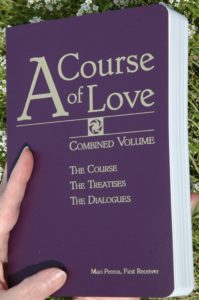 Within the embrace you can let all thought go. Within the embrace, you can quit thinking even of holy things, holy men and women, and even divine beings, even the one God. Is not the embrace itself holy? Is not the sunrise and sunset? Is not the least of the birds of the air as holy as the mighty eagle? The blade of grass, the fleck of sand, the wind and air, the ocean and her surf, all live by the universal heartbeat and exist within the embrace. Is not all you can imagine holy when you imagine with love? Is not all you cannot imagine holier still?
Within the embrace you can let all thought go. Within the embrace, you can quit thinking even of holy things, holy men and women, and even divine beings, even the one God. Is not the embrace itself holy? Is not the sunrise and sunset? Is not the least of the birds of the air as holy as the mighty eagle? The blade of grass, the fleck of sand, the wind and air, the ocean and her surf, all live by the universal heartbeat and exist within the embrace. Is not all you can imagine holy when you imagine with love? Is not all you cannot imagine holier still?
Sanctity is all that exists within the embrace. How could you be less than sacred? You exist in holiness.
The first step in remembering this holiness is forgetting. Let yourself forget that you do not feel holy and that the world does not appear to be sacred. Let your heart remember that you are holy and that the world is sacred. A thousand things can pull you from your remembrance. Forgetting “things” can free you to remember. (C:21-23)
As I look out on the beauty of winter’s sparseness, I know this beauty is true of the mind too. Our minds can rest, quietly alive in their new sparseness.
In A Course of Love we hear of both remembering and forgetting. Last week I spoke some of remembering. This week, I find myself intrigued by the idea of forgetting. There is a sort of existential idea of forgetting that relates to who we are. This is the idea that you and I, that humanity, has forgotten the truth or who we are. Now there’s a need to remember “the truth” of who we are and to forget “the illusion” of who we are. (T3:17.5) There’s even an “exercise in forgetting” included in “A Treatises on the Personal Self.”
I’ve always held an interest in the ways of “forgetting” because I do not have much recall of this Course. This forgetfulness has to do with our new way of knowing rather than our identity. At one time, this lack of recall felt, to me, like a failing, a curse, like a lack that was preventing me from engaging with others—even like a fear. I once asked myself, “How can I share A Course of Love when I can’t remember what it says?”
Well, I do this now by admitting I don’t remember when I don’t remember. What a relief!
Over time I’ve realized this is not a failing but part of the new way of knowing, and I realized this because I dared to talk about it. That’s how I found out how common it is. It is common to forget what was said in A Course of Love. You can finish a chapter that just knocked your socks off, and then suddenly question, with great surprise, how it is that you don’t remember the content of the chapter at all!
When you or I “forget,” it is not that we don’t “know!”
When you or I forget, it’s not that we don’t know! It’s almost like forgetting “how” we know, but not the knowing. What’s been forgotten is the words as chapter and verse. To realize this is to realize that you know these words in some other way—as if they are part of you and even more—living words. Words that move into you and me and come back out “as” you and me. And this is the whole reason necessitating our movement beyond learning.
While this letting go is a funny thing to feel and to begin to see as the new way, it’s a letting go of the ties that bind us to thinking, to teaching, and to learning. In this way of union and relationship, we come to know through the union and relationship offered by these living words. You and I share by sharing who we are in union and relationship as all we’ve received takes up residence in us and extends from us to our companions and from our companions to us.
The way of the past has been a knowing based on … shall we say … reiteration? On an idea that you don’t “know” unless you can pass the test that proves that you’ve committed to memory the “answer” to the question, that you can prove you have the knowledge in a prescribed way, or can demonstrate that you can teach the content of what is there.
How magnificent that Jesus spares us from this kind of knowing! How awesome for the mind and its ability to be in quiet…at least once it accepts our new way of knowing. Until it does, it can chatter away, plagued by all it doesn’t “think” it knows.
I invite you to welcome this sparseness of mind in which there is not some “thing” to know, and no division between the knowing of mind and heart.
Forgetting “things” can free you to remember. Remembering can free you to forget.
 Concepts have been used to order your world and to assist your mind in keeping track of all that is in it. Your mind does not need this assistance. To begin to conceptualize in ways that touch your heart will free your mind of its reliance on thought concepts, thus allowing heart and mind to speak the same language or to be communicated with in the same way. C:21.4
Concepts have been used to order your world and to assist your mind in keeping track of all that is in it. Your mind does not need this assistance. To begin to conceptualize in ways that touch your heart will free your mind of its reliance on thought concepts, thus allowing heart and mind to speak the same language or to be communicated with in the same way. C:21.4
The embrace can now be likened to the starting point of a shared language, a language shared by mind and heart and by all people. It is a language of images and concepts that touch the one heart and serve the one mind. C:21.6

